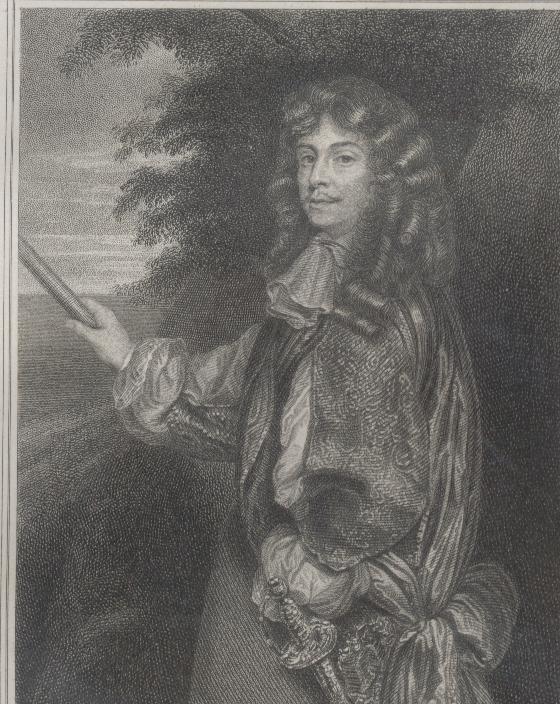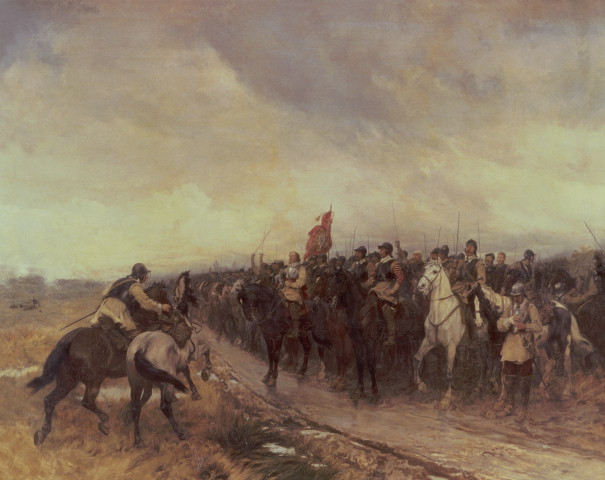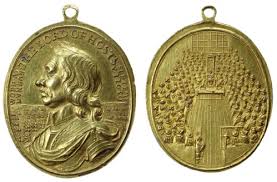The Death March to Durham
The aftermath of the 1650 Battle of Dunbar saw the grave mistreatment of 5,000 Scottish prisoners-of-war at the hands of the English Parliamentarian army. These battle-weary prisoners were starved of food and sleep, whilst at the same time force-marched over 100 miles to a makeshift prison in hellish conditions. Yet this is one of the least known stories of the civil war that raged across the whole of Britain, probably not surprising as it leaves such a black mark on England’s military history. ScotClans was contacted by a relative of one of the handful survivors of this terrible event which has led us to research the so named ‘Death March to Durham’.
One of the main outcomes of the Civil War was the execution of King Charles I by the Parliamentarian army for high treason. His exiled son, Charles II, was proclaimed King of Scotland on 5th February 1649 and this stance of support for the Royal Stewart House came as no surprise to the English parliament. However, they were concerned that the Scots may now try to force Charles II onto the throne in England, so Oliver Cromwell, not long back from fighting in Ireland, was sent by the parliament, with his 16,000 strong New Model Army to invade Scotland and head for Edinburgh. Cromwell’s army crossed the border at Berwick in the July of 1650.

Scottish General, David Leslie
David Leslie was the general of the Scottish army in Edinburgh, he believed that it would strategically be better to not be drawn out and therefore forced into engaging the English head on. Instead he decided to keep his men within the strong fortifications of the capital whilst Cromwell’s men camped outside the walls. Leslie’s army undertook a scorched-earth approach and destroyed the lands between Edinburgh and England. This meant that the English army could not live off the border crops, and had to rely upon supplies coming from south of the border. The supplies would arrive by boats, which gained entry at the port of Dunbar, but these visits became less and less.
Cromwell’s army were suffering not just due to the lack of food but also a massive oversight which left the majority of men without tents. Only 100 tents were brought which meant only the privileged officers had shelter. The weather was relentless, soldiers had to brave the elements, attempting to sleep, they were vulnerable and exposed to the Scottish climate. On August 3rd due to these incredibly difficult conditions where his men faced inevitable death Oliver Cromwell made a plea to the Scots suggesting that it is the king who was really the enemy, rather than him and his army. Cromwell begged: ”I beseech you, in the bowels of Christ, think it possible you may be mistaken.” His plea fell on deaf ears.
The 1st of September 1650 was a wet and miserable day and Cromwell’s army had withdrawn back east along the coast past Musselburgh and to their supplies base of Dunbar. The English were ill, demoralised, and exhausted with fatigue. One English soldier wrote, that they had been reduced to “a poor, shattered, hungry, discouraged army,”.
Meanwhile the Scottish army were not without their own problems. The Covenanter ministers were causing a lot of trouble. It was the ministers who provided the funds which paid for the army. This meant the ministers had power over David Leslie’s troops. The plan had been that Leslie’s army were to attack Cromwell’s men on the 1st of September, while the English were practically defenceless, but the Covenanters would not allow them to do this simply because it was a Sunday. Many believe that had Leslie been given permission to launch an offensive on the 1st, then the outcome of the battle would have been a lot different.
The Covenanters had also strongly urged Charles II to condemn his mother’s Catholicism, and attack the counsel that his late father had kept. Charles refused to make any such extreme public statements, and this left the ministers furious. In their frustrated state they purged the Scottish army of more than 3,000 men, dismissing many of Leslie’s most experienced and professional soldiers, including many officers, for crimes such as loose morals, blasphemy, and swearing. This vindictive act left one of the Scottish colonels outraged and he stated that Leslie had been left with an army of “nothing but useless clerks and ministers’ sons, who have never seen a sword, much the less used one.”
David Leslie was under intense pressure from the Church of Scotland to end this situation as quickly as possible because the Covenanters were also funding the Scottish army. When Leslie saw Cromwell’s army retreat, it was decided that he too would move his army east. He reached Dunbar before Cromwell, and so was able to get his men to the advantageous position on the top of Doon Hill which was to the south-east of the town.
The English were in a very desperate situation. Many of the men were close to death, morale was low and it looked like defeat was imminent. Especially as the Scottish army now had 14,000 men, sitting in the superior position. History shows a very different outcome, the next 24 hours saw the fate of the doomed English receive the miracle that not only saved their lives but probably dictated the future events that shaped Scotland’s future.
David Leslie wanted to wait with his men positioned on top of the hill, and force Cromwell into the situation where to needed to either attack a stronger army up-hill, or stay put and starve to death. Unfortunately for Leslie, the rather foolish and overconfident Covenanter ministers were impatient and demanded that Leslie moved his men down Doon Hill, and prepare for battle. At 4 pm on the 2nd of September, Leslie repositioned his troops at the foot of Doon Hill. Upon seeing this Cromwell could not believe his luck, and quickly thought of a strategy to turn the tables on the Scots. Under the cover of darkness Cromwell repositioned a large proportion of his troops to face the Scottish right flank, waiting to attack just before sunrise. On the 3rd of September English forces launched a surprise attack on the left, and centre flanks of the Scottish troops. They were held by the greater numbers of the Scots; however the English on the right managed to power their way through the Scottish flank and cause significant damage. Seeing this carnage thousands of the Scottish troops fled the battlefield and the battle was effectively over. The English cavalry chased down the fleeing soldiers over an area of eight miles, killing or capturing most, in what became known sarcastically as the ‘Race of Dunbar’. It was reported, though highly doubtful, that Cromwell’s men suffered as few as 20 deaths, compared to 3,000 Scottish fatalities, not including another 10,000 captured. It is said that seeing the crumble of the Scottish army Oliver Cromwell was in fits of uncontrollable laughter.
Victory for Leslie’s men would have changed the course of British history, with this being the last realistic opportunity for Scotland to take control of its own political and religious destiny. Unfortunately the chance was ruined by, as one writer put it, “a committee of Presbyterian ministers blinkered by religious fanaticism.” Cromwell went on to capture Edinburgh relatively unopposed, though Edinburgh Castle held out until that December. When the news reached the Rump Parliament in England, they were so overjoyed with the outcome of the battle that a Dunbar medal was issued for both the officers and the men. This was the first ever military medal to be issued in Britain, and was not done again until the Battle of Waterloo in 1815.
With the captured soldiers, Cromwell simply could not cope with 10,000 men, so around half were let go because they were either too ill or too injured from the battle, and he really had no use for them. At dawn on the 4th of September the 5,000 soldiers considered too dangerous for release were force-marched south to Durham, an eight day, 118 mile journey under the control of Sir Arthur Haselrigge, which was to become known as the ‘Durham Death March’. For the first 28 miles the Scots were forced to walk non-stop throughout the night until they reached Berwick without having had anything to drink or eat. It was common practice for the Scottish army to fast for at least a couple of days before a battle in order to sharpen their reflexes, so for many, by the 5th of September they had probably not eaten anything since the 1st, and were starving. Some locals in towns that were passed by the marching prisoners would, at their own risk, pass the Scots bits of bread, the only drink they had was dirty rainwater from puddles at the side of the road. Some tried to escape, but most, if not all, were recaptured by the English and were killed straight away. High numbers of these men were falling very ill with dysentery spreading and many died en route to Durham. When Haselrigge reached Morpeth in Northumberland he placed the prisoners in a cabbage field where he noted that “they ate up raw cabbages, leaves and roots…They poisoned their bodies. As they were coming from thence to Newcastle, some died by the wayside.”
At Newcastle Haselrigge put the prisoners up for the night in St Nicholas’ Church, the largest that could be found, however more men died, and by the morning a further 500 were not able to walk anymore. The conditions of the journey were so horrendous that by the 11th of September when the prisoners reached Durham, of the 5,000 who started the march, only 3,000 were still alive, with most dying of illness, starvation or exhaustion. Sadly for the ones that were still alive things were not about to get any better.
Durham Cathedral, founded in 1093, was used as a makeshift prison for the Scottish soldiers. The conditions were once again awful for the Scottish prisoners. They were deprived of any food, water, fuel or adequate bedding, and were treated in a harsh and inhumane manner. It is said that the jailers at Durham Cathedral blackmailed the prisoners, only giving them food or coal in exchange for whatever valuable possessions that they had. This led to the tombs within the cathedral being opened and desecrated, with the prisoners desperately looking for anything that could be used to trade. In order to keep warm, the Scots completely stripped the cathedral of whatever woodwork they could get their hands on to burn, with the notable exception of Prior Castell’s Clock in the South Transept, which is believed to have survived only because it has a thistle carved into it. The clock is still in Durham Cathedral to this day.
Despite these appalling conditions, Sir Arthur Haselrigge wrote that the prisoners were being fed good meat; the injured and the ill being cared for; and they were treated better than any prisoner has ever been treated in England. It is generally accepted though by historians that Haselrigge, who was in Newcastle at this time and not in Durham, genuinely believed that this was the case.
With next to no food, water, or heat it is said that the Scots were dying at an average of 30-a-day, though with some days the figure was around 100. By the 31st of October of the 5,000 that had started the “death march” to Durham, over 3,500 died due to the disgusting and unimaginable way that they were treated. For the 1,600 that died in Durham Cathedral none were treated any better by the English in death than they had been in life. All were thrown into a mass grave, buried without coffins, without a Christian service, and without any form of marker to acknowledge their presence. Of those who survived 900 were sold as slaves and sent off to the colonies in the New World, primarily to Virginia, Massachusetts, or Barbados, whilst the remaining 500 were sent off the following spring to fight in the French army.
The mass grave for the Scottish soldiers was not discovered for nearly 300 years when, in 1946, workmen installing the cathedral with a new heating system came across the bodies.
An ongoing campaign is in place to get Durham Cathedral to acknowledge the presence of the Scottish prisoners as well as the inexcusable treatment and deaths they suffered by putting up a memorial, and giving the grave a proper Christian blessing.
Tagged












Bobby Burns said
“Many and sharp the numerous ills inwoven with our frame,
More pointed still we make ourselves, regret, remorse an shame,
And man who’s heaven erected face the smiles of love adorn,
Man’s inhumanity to man makes countless thousands mourn.”
It’s hard for me as a Christian to believe that any fellow Christian would resist acknowledging the suffering of our fellow men, and not bless their final resting place, nor mark it with a proper memorial.
I know this story well. As a descendant of Ninian Beall (Bell) I have read many versions. After reading “The War of The World” by another Scotsman ,it suddenly seems quite tame. The Beall family settled in Maryland where Ninian acquired 20000 acres of what is now Washington. Strangely I am a descendant of Captain Thomas Besson (Benson) who fought in the Battle of great Severn in 1651. This is considered the last battle of the English Civil war and was won in fifteen minutes by my ancestor and the other settlers of Providence. Not surprisingly this battle was a result of fellow christians fighting over which prayer book should be read. Following a recent trip to Prague to see my new granddaughter Rebecca I was taken by the dark forces that have ruled Christianity for ages. No wonder the Czech people are over eighty percent agnostic. Dan Benson in Maryland 360 year after Thomas Benson arrived.
Thomas Besson (Benson) fought AGAINST the English at Severn. My cousin lives on the rd. St. Margaret which goes to Providence,( now Greenbury point on the USNA campus. Maryland is a small state.
People keep trying to impose ‘modern values’ on different Centuries.
Cromwell issued a proclamation in the days after the battle which was sent with Cornets all over Scotland, telling people that they might collect their dead and wounded without interference but they may not remove weapons from the field. He also gave instructions with regards to the prisoners wellbeing which were not adhered to.
At the time of the battle, Haselrigg must either have been at or near Berwick and would not have been able to get past Cockburnspath, so the prisoners would not have become his responsibility until they were near Berwick.
That means that the soldiers escorting the forced march must have been what Cromwell could spare out of his diminished force. Equally ill fed and equally exhausted as the Scots. Thus the initial forced march to Berwick.
What the Scots had tried to do was impose Charles II as King of England by proclaiming him, not just King of Scotland, but also of England and Ireland.
What Cromwell did was to free the Scots from the tyranny of the presbyterians, who were horribly like the Taliban on today.
Their cruelties knew no bounds and their treatment of prisoners was horrible. They used religion to further their own aims and to gain land and property.
Durham Catherdral Abu Grabe or Guantanamo bay… We didn’t come far!